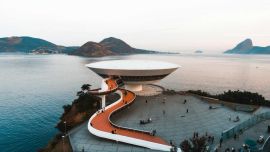A man was arrested in Argentina after pointing a gun at Vice-President Cristina Fernández de Kirchner as she greeted supporters outside her residence in Buenos Aires, a rare case of political violence that shocked the South American nation.
Video footage circulating on social media Thursday night showed a man coming within inches of the vice-president and pulling the trigger of the gun, which did not fire. The man was arrested on the scene.
The incident comes at a time in which Argentina is bitterly polarised after years of economic crisis and political infighting. Even the Peronist ruling coalition is divided between Fernández de Kirchner’s far-left supporters and the more moderate followers of President Alberto Fernández. Argentina has seen low levels of political violence since a return to democracy in 1983.
Fernández said the incident was an “attempt against the life” of the vice-president and that the gun had five bullets but did not fire “for technical reasons that have yet to be confirmed.”
A video of the attack is being shared on Twitter and has been viewed millions of times.
“We are obliged to recover the democratic coexistence broken by hate speech,” he said in a recorded video message, adding that he decreed Friday a national holiday. “This event is extremely grave.”
On Friday, Fernández de Kirchner’s supporters are expected to convene in downtown Buenos Aires to express solidarity. A spokesman for Fernández de Kirchner didn’t say if she would speak later in the day.
Luiz Inacio Lula da Silva, the leftist former Brazilian president bidding to defeat Jair Bolsonaro in next month’s elections, tweeted his solidarity with Fernández de Kirchner. Governments around the world sent condolences to the vice-president and her government through Thursday night and Friday morning.
“This violence and political hatred that has been encouraged by some is a threat to democracy in our region,” Lula said in a tweet.
Government representatives and the opposition in Argentina unified in denouncing the attack, with senators from both sides standing for a photo together in congress showing support across party lines. As vice-president, Fernández de Kirchner is the head of the Senate.
“If the political class puts itself above this crime and achieves consensus on key issues,” it could help lift public opinion across the spectrum, said Lucas Romero, director of Buenos Aires-based consulting firm Synopsis. “If that doesn’t occur, this crime is going to permeate throughout the political divide.”
Former president Mauricio Macri, a political rival of Fernández de Kirchner, condemned the incident, asking the justice and security system to clarify the events around the situation as soon as possible.
The attacker is a 35 year-old man of Brazilian nationality living in Argentina who had a history of carrying weapons, according to newspaper Clarín. Brazil’s Foreign Minister Carlos Franca said the country’s Embassy in Buenos Aires is following the situation closely.
Corruption Case
Crowds have gathered outside of Fernández de Kirchner’s home in the Buenos Aires neighbourhood of Recoleta since a federal prosecutor last week called for 12 years of prison and a lifetime ban on public office for the former president as part of a corruption trial.
Fernández de Kirchner is accused of alleged fraud and leading an “illicit association” with other government officials and businessmen, whose companies received numerous public works contracts while she was Argentina’s president from 2007 to 2015.
The vice-president, who holds a high level immunity in her dual role at the Senate, has long denied any wrongdoing, lambasting the charges as politically motivated. She’s unlikely to face jail time in the near term.
Hard times
The assassination attempt comes at an already chaotic time for crisis-prone Argentina. Inflation is over 70 percent, the highest level in three decades and fuelling fears of a potential currency devaluation. Nearly 40 percent of Argentines live in poverty. The government’s internal divide over economic strategy has translated into three economy ministers since early July.
Argentina is struggling to comply with its US$44-billion agreement with the International Monetary Fund, which has long been a source of divide between Fernández de Kirchner and Fernández. While the government is reducing spending, it has not accumulated enough cash reserves to be close to the target in the deal, raising questions about how the IMF and Argentina will move forward.
Economy Minister Sergio Massa is expected to meet IMF Managing Director Kristalina Georgieva September 12 in Washington, according to an IMF spokesperson.























Comments